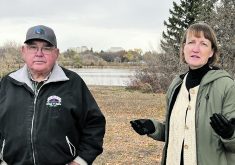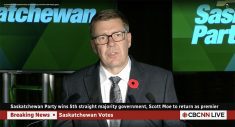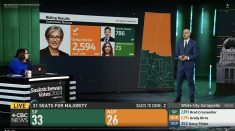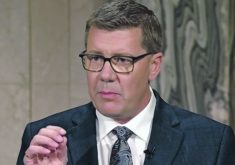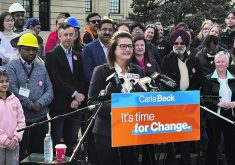History offers answers to why rural voters have become significant supporters of conservative politics in Saskatchewan
The Saskatchewan Party led by Scott Moe appears poised to win a fourth consecutive mandate Oct. 26 and rural voters will largely be responsible.
Polls and vote projections mid-way through the campaign indicate no change in rural constituencies, which are all held by the Sask. Party. With 31 seats required for a majority, the 29 rural seats practically seal the deal. The 12 seats in Regina, 14 in Saskatoon, two in Moose Jaw and two in Prince Albert are considered urban, while the two northern ridings consistently vote NDP.
But rural voters haven’t always been staunchly right wing.
Read Also

Saskatchewan throne speech promises strong economy
Saskatchewan’s legislative agenda for the coming year will focus on meeting the challenges of new world trading relationships, said the speech from the throne.
University of Saskatchewan political scientist Joe Garcea said historically movements like the Co-operative Commonwealth Federation, precursor to the New Democratic Party and at one time most popular in rural Saskatchewan, grew as a defence against Eastern Canada.
While Alberta and British Columbia moved to the right with Social Credit, Saskatchewan went to the left.
Garcea said there are two reasons for these types of movements. One is the grievance against the eastern establishment.
“The second is kind of a lament that rural people have that they need a protector, because a lot of institutions tend to be against them,” he said. “That’s what Tommy Douglas and the CCF were able to do.”
But over time, as people begin to feel that someone hasn’t lived up to his or her promises, they mobilize for change.
Part of the problem in Saskatchewan was that Douglas went to Ottawa.
The last 60 years have seen Liberal, NDP and Progressive Conservative governments with rural voters backing all of them at times.
When they elected the Sask. Party in 2007 the economic boom had already started and there has been no reason to look for another saviour, Garcea said.
“The Sask. Party has been able to ride this boom for all these years,” he said.
Jim Farney, political scientist at the University of Regina, said the original success of the CCF was based on a farmer/labour coalition but rural Saskatchewan has changed.
“Farmers have changed,” he said. “The NDP lost touch.”
The party attracted more white-collar urban professionals, along with the most impoverished, and family farms transitioned to an owner-operator agri-business model that didn’t fit in.
Farney said that’s also true of other rural businesses, such as oilfield and construction companies.
He said what began when the NDP’s Allen Blakeney government “lost track of rural Saskatchewan” largely ended with the Roy Romanow budget that cut 52 rural hospitals.
“That was the change that cemented it and ended it,” he said of widespread NDP support in rural Saskatchewan.
Farney said that another populist movement could change the situation again. He also wonders which party will be able to engage with and mobilize First Nations voters as some rural constituencies become more indigenous.
Garcea said the NDP still has a lot of support in Saskatchewan despite a lack of seats. He said the outcome of this election could force the party to take a good, long look at itself, particularly if the party doesn’t gain seats.
“What could happen is just as the conservatives had to enter into a marriage with the Liberals to form the Sask. Party it makes one wonder what the NDP might do in order to reinvent itself,” he said. “It might even entail wholesale change and perhaps even abandoning the brand and getting a fresh start.”
There are 236 candidates seeking election this year. Both the Sask. Party and NDP are running full slates of 61 while the Saskatchewan Green Party is running 60 candidates.
Also running are 31 Progressive Conservative candidates, 17 for the Buffalo Party of Saskatchewan, three Liberals and three independent candidates.
A full list of who is running where can be found at elections.sk.ca.




